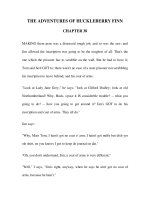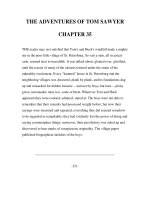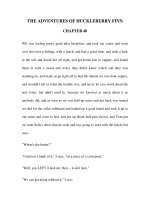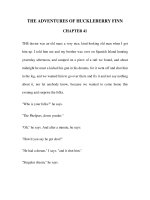tác phẩm văn học của nhà văn Daniel defoe tác phẩm the adventures of robinson crusoe
Bạn đang xem bản rút gọn của tài liệu. Xem và tải ngay bản đầy đủ của tài liệu tại đây (1.94 MB, 114 trang )
CALICO
T he
Daniel Defoe’s
CLASSICS
Adventures of
Robinson Crusoe
A DA P T E D BY :
Jan Fields
I L L U ST R AT E D BY :
Eric Scott Fisher
CALICO
T he
Daniel Defoe’s
CLASSICS
Adventures of
Robinson Crusoe
A dapted by: Jan Fields
Illustrated by: Eric Scott Fisher
visit us at www.abdopublishing.com
Published by Magic Wagon, a division of the ABDO Group,
8000 West 78th Street, Edina, Minnesota 55439. Copyright
© 2010 by Abdo Consulting Group, Inc. International copyrights
reserved in all countries. All rights reserved. No part of this book
may be reproduced in any form without written permission from
the publisher.
Calico Chapter Books™ is a trademark and logo of Magic Wagon.
Printed in the United States of America, Melrose Park, Illinois.
102009
012010
Original text by Daniel Defoe
Adapted by Jan Fields
Illustrated by Eric Scott Fisher
Edited by Stephanie Hedlund and Rochelle Baltzer
Cover and interior design by Abbey Fitzgerald
Library of Congress Cataloging-in-Publication Data
Fields, Jan.
The adventures of Robinson Crusoe / adapted by Jan Fields ;
illustrated by Eric Scott Fisher ; based upon the work of Daniel
Defoe.
p. cm. -- (Calico illustrated classics)
ISBN 978-1-60270-703-0
[1. Shipwrecks--Fiction. 2. Survival--Fiction. 3. Adventure and
adventurers--Fiction.] I. Fisher, Eric Scott, ill. II. Defoe, Daniel,
1661?-1731. Adventures of Robinson Crusoe. III. Title.
PZ7.F479177Ad 2010
[Fic]--dc22
2009036526
Table of Contents
CHAPTER 1: Out to Sea . . . . . . . . . . . . . . . . . . 4
CHAPTER 2: Pirates! . . . . . . . . . . . . . . . . . . . 10
CHAPTER 3: A Clever Escape . . . . . . . . . . . . 14
CHAPTER 4: Shipwrecked . . . . . . . . . . . . . . . 21
CHAPTER 5: The Island . . . . . . . . . . . . . . . . . 26
CHAPTER 6: A Proper Settlement . . . . . . . . . 30
CHAPTER 7: Putting Things in Order . . . . . . 36
CHAPTER 8: Exploring the Island . . . . . . . . . 40
CHAPTER 9: Island Life . . . . . . . . . . . . . . . . . 46
CHAPTER 10: The Sixth Year . . . . . . . . . . . . . 50
CHAPTER 11: The Mysterious Footprint . . . . . 54
CHAPTER 12: Living in Fear . . . . . . . . . . . . . . 60
CHAPTER 13: A Guest . . . . . . . . . . . . . . . . . . 65
CHAPTER 14: Teaching Friday . . . . . . . . . . . . 72
CHAPTER 15: Captives . . . . . . . . . . . . . . . . . . 77
CHAPTER 16: The English Ship . . . . . . . . . . . 84
CHAPTER 17: Securing the Ship . . . . . . . . . . . 94
CHAPTER 18: Strange Homeland . . . . . . . . . . 99
CHAPTER 19: New Adventures . . . . . . . . . . 107
1
Out to Sea
My name is Robinson Crusoe. I was born in
1632 in the city of York. Being the third son of
the family, I had no great hope of inheritance.
My father planned for me to study law. I
wanted to go to sea.
“Don’t be foolish,” Father scolded when I
brought up the subject. “The sea is for the very
wealthy or the very poor. The poor need to find
fortune. The wealthy seek fame. But your life
will be comfortable and steady.”
Comfortable and steady seemed much like
gloomy and dull to me. “I believe I can find
greater happiness in adventure,” I suggested.
At this my father’s eyes filled with tears. “Do
you not remember your brother? He craved a
4
life of adventure and went to war. Where is he
now? Would you go the same way?”
How could I press my case against such
concern? I put all thoughts of the sea out of
my mind for several weeks. But I could not
settle down.
I finally spoke to my mother, hoping she
might convince Father of my case. “Perhaps a
short voyage,” I suggested. “If it turns to misery
as Father predicts, I will come home.”
“How could you think such a thing?” Mother
demanded. “After the talk you had with your
father, we hoped such foolishness would have
left you!”
Clearly I had only one option. I ran away.
Not immediately, of course. I moped and
complained for nearly a year. Then a friend
suggested I travel with him by sea to London.
Without a word to my parents, I boarded the
boat.
On September 1, 1651, we set sail for
London. Soon the wind blew heavily, driving
5
waves against us. The ship leaped and bucked
like an angry horse. My stomach leaped with it
and I was most miserably sick.
I fell to my knees in my cabin and prayed
that I would not die for disobeying my parents.
Throughout the storm I bargained, begged, and
promised. I would take up the law. I would be
a good and obedient son.
Then the sea calmed. My stomach settled.
The smooth sea with the sun upon it delighted
me. And while I gazed upon the sea, my friend
walked up and clapped me on the back.
“Did that capful of wind frighten you?” he
asked.
“A capful!” I cried. “It was a terrible storm.”
“That squall was nothing,” he laughed. He
must have noticed my doubtful face because he
added with a grin, “Well, ’tis charming weather
now. Let’s settle down and celebrate your
survival.”
And so we did. In the merriment I forgot
my vows. I forgot the storm. In the next five
6
7
or six days of good weather, I committed myself
completely to the sea. I was certain that I
would never regret my choice.
A few days later, the sky darkened. The
wind blew hard. I laughed in the face of the
storm. All hands gathered on deck to make
everything snug as we rode the rough seas.
My stomach began to answer the roll of the
sea. I retired to my cabin, sure I would soon
see clear skies again. Then I heard the ship’s
master passing by my cabin door. “Have mercy
on us,” he prayed. “Let us not be lost!”
That begging did not ride well on my mind
or my stomach. I got up and stumbled out of
my cabin. The sea rose and broke upon us
every few minutes. We cut away our masts so
that the wind might not push us over.
A voice cried out, “All hands to the pumps!”
The ship had sprung a leak. Though fear
made me clumsy, I followed the rest of the men
and joined my strength to theirs.
8
Suddenly, a great boom rocked the ship. I
knew the storm had broken the ship in two! I
collapsed in a heap on the floor. A man stepped
calmly over my body and took my place at the
pump.
Another boom rang out. “What is it?” I
screamed.
“The ship’s gun,” someone called. “The
captain is signaling for help.”
Finally, the captain’s shots of distress were
answered. A lighter craft risked the dangerous
sea to bring the crew safely to port. Barely after
leaving the ship, we watched it sink.
Rowing to shore took the strength of every
man, but we made it. Do you imagine I rushed
home the moment my feet touched shore? I
pictured the knowing nods of my parents. I
could not bear to be the butt of jokes about my
foolish choices.
9
2
Pirates!
My decision to return to the sea was sealed
when I came upon my friend and his father one
day. My friend introduced us and shared the
story of how I came to sea.
“Young man,” said the father, “you ought
never to go to sea anymore. You are not meant
to be a seafaring man.”
The man sounded entirely too much like my
father for my liking. I felt my backbone stiffen
and my chin rise.
“You have seen the same token,” I said. “Will
you quit the sea?”
“My case is different,” he replied. “The sea is
my calling.”
10
“I believe it is mine as well,” I insisted. “I’ll
not turn away from it, no matter the predictions
of you or my father.”
“Then you make a choice that endangers
anyone fool enough to sail with you,” he said,
backing away. “I would not set my foot in the
same ship with you for a thousand pounds.”
I was now determined to sail. I searched for
another voyage that might appeal to me. I met
the master of a ship that had recently come
from Africa and was preparing to return.
The master was honest and kind. He took a
liking to me, and we talked at length about my
desire to see the world.
“You may ship with me,” he said. “I’ll show
you the world and the fortunes a young man of
courage can make.”
I agreed and followed his directions perfectly.
I turned to relatives to collect forty pounds to
buy trinkets and toys. These I took aboard
when we sailed.
11
The sail was smooth to the coast of Africa.
The master spent many hours teaching me
about navigation, record keeping, and other
such bits of seaman’s craft. I soaked up his
knowledge like a sponge, and we grew as close
as family.
Not only did the voyage educate me, but it
enriched me as well. I returned to London with
five pounds of gold dust. I had settled upon my
life’s calling. I would be a merchant and sail
with my friend, growing richer with each trip.
The ship’s master took me home with him.
I met his fine wife and we made plans for the
next sail. Unfortunately, before our plans could
come to be, the kind man died.
I left the bulk of my earnings with his widow
in safekeeping and shipped out again as a
merchant. It was the same ship, but sadly not
the same master. And with the loss of my good
friend, my luck seemed to slip away as well.
Near the northern African shore, we were set
upon by a Turkish pirate ship. We tried to
12
outrun the pirates, but they had the faster ship.
We fired upon them with our twelve small
cannons and they returned fire with their
eighteen cannons and smaller guns as well.
The pirate ship sailed close and sixty men
jumped over to board us. We fought back. We
even tossed powder chests, which exploded and
scattered deadly bits of nails and scrap iron.
The pirates hacked at our rigging. They
killed three of our bravest men and wounded
more. Finally, we surrendered and were taken
aboard their ship as prisoners.
We were carried to the pirate base at Sallee.
Then, the captives were taken to be presented
to the Moorish emperor. I alone stayed, as the
pirate captain’s prize. And so I began my life
as a slave.
13
3
A Clever Escape
I plotted to escape. I hoped I might sail with
the pirates and be freed when an English ship
took them captive. But whenever the pirates
sailed, I was left behind.
Over the next two years, my position in the
house slowly rose. The captain learned I was
good at fishing. He took me with him on trips
in a small fishing boat whenever he was home.
Eventually, he began letting me fish with
only his cousin Ismael and a young slave named
Xury. Though Ismael served as guard on these
trips, he was young and paid little attention. He
treated me as a coworker instead of a slave.
One day, the captain planned a fishing and
bird-hunting trip with some local men. The
14
boat was filled with food and guns. At the last
moment, the men decided they would remain
at the master’s house. I was sent to catch fish
for their supper.
Surely, I thought, no greater opportunity will
come my way. I fished for some time but made
certain to catch nothing, urging Ismael to go
farther and farther to catch the fish the master
would want.
Finally, I was content we had gone as far as
we dared. I crept up behind Ismael and tossed
him into the water.
He rose immediately, coughing. “Wait!” he
called. “Don’t leave me here to drown with the
sharks!”
At first I ignored him, but he swam strongly
toward the boat. I had no choice but to take
up a gun.
“You swim well,” I called to him. “You’ll
have no trouble reaching shore. But if you
come nearer this boat, I’ll shoot you.”
15
Ismael turned quickly away from the boat
and swam for shore. Then I turned to Xury and
said, “If you’ll remain faithful to me, I’ll make
you a great man.”
I nodded pointedly at the gun. “But if you’ll
not swear to be true to me, I’ll throw you in the
sea as well.”
The young boy smiled at me and eagerly
promised his faithfulness. We struck out to sea
with the boat. I was terrified the pirates would
catch us again, so we sailed without stopping
for five days.
Finally, the need for fresh water pushed me
toward land. We found the water we needed
but quickly hurried back to our boat. On our
stops, I depended on Xury to spot game, skin
animals, and such. He depended upon me for
the protection of the guns.
We saw no sign of people for many days, but
finally we passed a shore upon which a small
group stood. They wore few clothes and their
16
skin was very dark. We did not go ashore, and
they showed no interest in coming closer.
I made gestures to them that we were hungry
and thirsty. Several dashed away and returned
with meat and dried vegetables. A great clay
container filled with water was carried to the
shore.
Suddenly, two great cats burst from the thick
trees not far from the beach. Most of the
people ran in fear, but one man stayed. He held
17
a long stick and seemed intent on protecting the
group.
As soon as the cats appeared, Xury fetched
my guns. I shot the larger of the two cats and
the other ran way from the sound of the gun.
I made signs that I wanted the people to
have the cat. They were clearly delighted.
They skinned it with nothing more than a knife
made of wood, and offered me the skin. I
accepted it gladly.
We parted company with each side content.
Xury and I sailed for eleven more days until the
shore began to point slightly out to sea. In the
distance, I could make out islands. I was certain
we had come upon the Cape de Verde.
Suddenly Xury called out, “Master, a ship
with a sail!”
I could hear the fear in his voice and knew
he worried that the ship contained more
pirates. I recognized the vessel as a Portuguese
ship.
18
I sailed fast toward it and fired the guns,
hoping the sound would catch their attention.
I waved the flag that had belonged to the past
captain, desperate to catch the eye of the
Portuguese seamen.
The ship allowed us to approach. The sailors
called out to me, first in Portuguese, then
Spanish and French. I understood none of these
and called back in English.
At last a Scotch sailor was found to be my
translator. I was able to tell them of my escape
from slavery. I was so grateful for rescue that I
offered all I had to the captain in thanks.
“You owe me nothing,” the captain assured
me. “I have offered only what I would hope to
receive in your place. We will carry you safely
to the Brazils. You will need your things to
make your way there.”
He commanded his crew that none should
touch my things. He bought the small boat I
had sailed on and the animal skins I had
collected.
19
“I would like to buy the boy also,” he said,
gesturing to Xury.
“He helped me escape,” I said. “I should not
sell him back into slavery.”
“Then let me not buy his whole life,” the
captain said. “Let me buy ten years of his
service aboard the ship, after which he shall go
free.”
I turned to Xury to see what he would say. I
did not wish to insult the captain, but I owed
Xury much. Xury agreed that he would sail
with the captain for ten years and the bargain
was struck.
20
4
Shipwrecked
We had a good sail to the Brazils and arrived
in about twenty-two days. I carried a small bag
of silver coins and all the belongings that the
captain had not bought.
I lived for a while on a sugar plantation run
by a friend of the captain. I learned the basics
of growing and making sugar. It seemed a good
life and profitable. I bought as much land as I
could and began planting.
I sent to England for the money I had left
with my friend’s widow. With it, I was able to
buy a slave and an indentured servant to help
with the work.
But life as a plantation owner grew dull. I
wanted to be on the sea again. So I made a plan.
21
Every plantation needed more workers than
we could hire. I went to the owners with a
proposal. If they would fund the voyage, I
would set sail for Africa and purchase slaves.
Then I would distribute them to the various
plantations.
This idea met with approval.
On
September 1, 1659, I boarded our ship for
Africa. I scarcely noted that this was the same
date I had boarded my first ship eight years
before!
We sailed well northward before striking out
across the ocean toward Africa. The weather
was good, though brutally hot until we turned
out to sea.
Some twelve days later, a fierce storm
slammed our ship for a dozen days, driving us
wherever it would. At every moment, I
expected to die. Indeed, two of the crew were
washed overboard by the storm.
Finally, the storm died back and the captain
looked for a place to bring the ship ashore. The
22
ship was too damaged to attempt a sea crossing
now. The captain decided to press north to
Barbados, which looked reachable. But only a
few days later another storm struck and pushed
us westward.
“Land!” the watchman shouted from the
rigging. He pointed into the roaring storm.
“Land!”
We rushed to see. Suddenly, the ship struck
upon a sandbar and stopped. The sea washed
over the sides as if to cleanse the broken ship.
The ship had carried two small boats. One
had been smashed in the storm. We needed to
launch the last boat and row away from the
broken ship if we were to survive the day.
The mate laid hold of the boat and we
helped sling it over the ship’s side. Eleven of
us piled in. We had no sails, only oars.
The winds fell, but the sea rose violently as
we struggled toward land. A massive wave
turned us and we were scattered into the sea.
23









